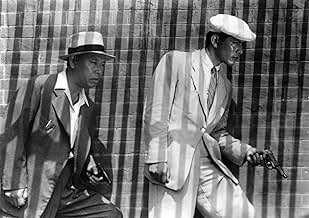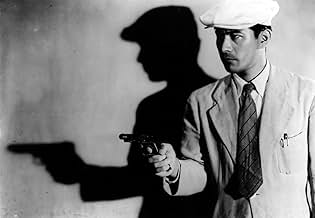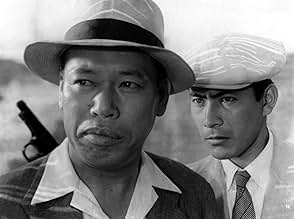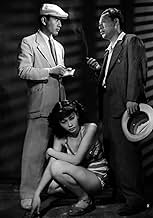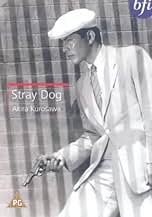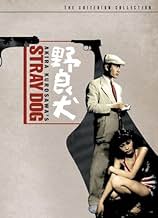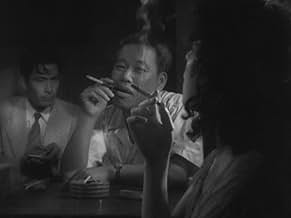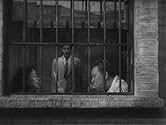During a sweltering summer, a rookie homicide detective seeks advice from a seasoned colleague while trying to track down his stolen Colt pistol.During a sweltering summer, a rookie homicide detective seeks advice from a seasoned colleague while trying to track down his stolen Colt pistol.During a sweltering summer, a rookie homicide detective seeks advice from a seasoned colleague while trying to track down his stolen Colt pistol.
- Director
- Writers
- Stars
- Awards
- 4 wins total
- Director
- Writers
- All cast & crew
- Production, box office & more at IMDbPro
7.820.4K
1
2
3
4
5
6
7
8
9
10
Featured reviews
Early Kurosawa is still good Kurosawa
This early Kurosawa effort floats stylistically somewhere between the film noir and neo-realism, incorporating the best from both worlds to elaborately craft a landscape (both physical and social) of post-war Japan. It's only been 4 years since the dreadful A-bombings and the subsequent defeat of Japan in WW2 and both the country and the people are deeply scarred. War veterans return home to find a country torn by poverty and as the saying goes, desperate conditions demand desperate measures.
A very young Toshiro Mifune plays the greenhorn detective who has his gun stolen and spends the rest of the movie trying to track down the culprit. As it turns out the culprit is a war veteran just like Mifune's character, only where the latter tried to do good and found an honest job, the former opted for the easy way out and became a criminal, using the stolen gun to rob and kill. This adds an additional layer of motivation for detective Sato. Not only does he have to restore his honour (ironically symbolised by the lost gun which he tries to retrieve), but also redeem himself by bringing the killer to justice. What makes matters worse for him is that every time his stolen gun is fired someone dies or gets injured, which adds another burden of guilt on the shoulders of the young detective.
The story might appear too moralistic and convenient (both antagonist and protagonist share a common background, being war veterans, making the distinction of good and bad all too easy), but it has to be seen in the context of the times. Mifune says that there are no bad people, only bad situations. But as his detective collaborator on the case remarks (played by the great Takashi Shimura, who also starred in Seven Samurai) he faced the same bad situation and made something good out of it. Kurosawa here neatly balances the social climate of post-war Japan and the conditions of the times with personal responsibility.
Story-wise it's a worthy effort, but like Rashomon, it sounds a little bit better than it actually is. Not that Stray Dog is a bad movie by any means, but clocking in at 2 hours it starts to drag near the middle. There are some nice set-pieces that showcase Kurosawa's growing talent (like the phone scene in the hotel where he uses inter-cutting to great effect) and the performances are solid all around. There's also a silent 10 minute montage of location footage shot in rundown neighborhoods as Sato searches the black market for his gun, which serves as a poignant snapshot of Japanese history.
Kurosawa would go on to achieve international acclaim with his next movie, Rashomon, but Stray Dog already shows that he was destined for great things. Compared to later entries in his filmography Stray Dog appears to be a minor entry, but it's still well worth the time to discover.
A very young Toshiro Mifune plays the greenhorn detective who has his gun stolen and spends the rest of the movie trying to track down the culprit. As it turns out the culprit is a war veteran just like Mifune's character, only where the latter tried to do good and found an honest job, the former opted for the easy way out and became a criminal, using the stolen gun to rob and kill. This adds an additional layer of motivation for detective Sato. Not only does he have to restore his honour (ironically symbolised by the lost gun which he tries to retrieve), but also redeem himself by bringing the killer to justice. What makes matters worse for him is that every time his stolen gun is fired someone dies or gets injured, which adds another burden of guilt on the shoulders of the young detective.
The story might appear too moralistic and convenient (both antagonist and protagonist share a common background, being war veterans, making the distinction of good and bad all too easy), but it has to be seen in the context of the times. Mifune says that there are no bad people, only bad situations. But as his detective collaborator on the case remarks (played by the great Takashi Shimura, who also starred in Seven Samurai) he faced the same bad situation and made something good out of it. Kurosawa here neatly balances the social climate of post-war Japan and the conditions of the times with personal responsibility.
Story-wise it's a worthy effort, but like Rashomon, it sounds a little bit better than it actually is. Not that Stray Dog is a bad movie by any means, but clocking in at 2 hours it starts to drag near the middle. There are some nice set-pieces that showcase Kurosawa's growing talent (like the phone scene in the hotel where he uses inter-cutting to great effect) and the performances are solid all around. There's also a silent 10 minute montage of location footage shot in rundown neighborhoods as Sato searches the black market for his gun, which serves as a poignant snapshot of Japanese history.
Kurosawa would go on to achieve international acclaim with his next movie, Rashomon, but Stray Dog already shows that he was destined for great things. Compared to later entries in his filmography Stray Dog appears to be a minor entry, but it's still well worth the time to discover.
10davidals
Kurosawa's first major masterpiece
STRAY DOG stands as the legendary Akira Kurosawa's first real masterpiece, noteworthy for at least two big reasons: the style - classic American film noir (rich, velvety b&w atmospheres), enhanced with a touch of Italian neo-realism (great use of diverse locations, which provide a great view of day-to-day postwar Japan), and the star, a young Toshiro Mifune, whose truly collaborative association with Kurosawa was cemented here, and would grow in spectacular fashion during the subsequent 16 years.
Mifune became as much of an international icon as Kurosawa, and this is the first film where it's easily evident why. As an example of film noir, STRAY DOG offers plenty of gripping suspense and moral complexity, and holds up well alongside classics like THE BIG HEAT, THE KILLING or THE MALTESE FALCON. Kurosawa touched upon international influences to an unprecedented degree in Japanese film (the internationalist impulses of Ozu, Kenji Mizoguchi or Mikio Naruse are just as deep and varied, but far more discreetly deployed), Kurosawa also skillfully highlights Japanese specifics (the rookie cop expecting to be fired, even accepting the possibility in an apologetic fashion, only to be assured that he will not be fired - this would not occur in a similar American setting), while always linking the same details to universals: honor, nobility, responsibility. This would become the thread linking Kurosawa's celebrated period/samurai films to his contemporary dramas. STRAY DOG was perhaps the first of his films where it truly resonates in a global fashion - a timeless, classic film.
Mifune became as much of an international icon as Kurosawa, and this is the first film where it's easily evident why. As an example of film noir, STRAY DOG offers plenty of gripping suspense and moral complexity, and holds up well alongside classics like THE BIG HEAT, THE KILLING or THE MALTESE FALCON. Kurosawa touched upon international influences to an unprecedented degree in Japanese film (the internationalist impulses of Ozu, Kenji Mizoguchi or Mikio Naruse are just as deep and varied, but far more discreetly deployed), Kurosawa also skillfully highlights Japanese specifics (the rookie cop expecting to be fired, even accepting the possibility in an apologetic fashion, only to be assured that he will not be fired - this would not occur in a similar American setting), while always linking the same details to universals: honor, nobility, responsibility. This would become the thread linking Kurosawa's celebrated period/samurai films to his contemporary dramas. STRAY DOG was perhaps the first of his films where it truly resonates in a global fashion - a timeless, classic film.
10poe426
Kurosawa noir...
With his penchant for incorporating "Western" ideas into his films, Kurosawa hits yet another home run with his take on the crime film. As ever, he manages to make scenes that would (in the hands of a lesser director) seem boring become absolutely riveting. Mifune's ride on the trolley, when he loses his gun, for instance; or the scene where he has to explain the situation to his superiors (and the subsequent search through police files for a suspect); or the long undercover sequence. We can almost feel his frustration. The tension mounts. And yet again we have the brilliant Shimura playing off of Mifune, speaking in carefully modulated tones as he dispenses advice to the hotheaded young detective. If ever there was a more perfect combination of performers in cinema history, I never saw them.
More than just noir
This early Kurosawa film interested me not only as a historical object, but because, as in every one of his films I've seen so far, the moral and philosophical implication of the story carries as much weight as the dramatic and poetic aspects. As another commenter said here, "When was the last time you saw a film where the central character had something called a moral imperative." To me it's extremely gratifying to find directors like Kurosawa, Bergman, and today's Hirokazu Kore-eda who treat moral themes seriously and with dignity, and don't shy away from difficult questions.
I was also intrigued by how almost every scene bears, already, the stamp of Kurosawa's unique vision as a director. I have no idea how this comes about, but there's just something there, almost like a fingerprint, that says "Kurosawa" unmistakeably. I would have to leave it to more gifted and better schooled viewers than myself to explain it, but I love seeing it. In part, I suppose it's due to the exceptionally fine cinematographers that Kurosawa habitually worked with.
I think the film is about thirty minutes too long, but if I have to see a film that's a bit too long, I'm at least glad it's by Kurosawa!
I was also intrigued by how almost every scene bears, already, the stamp of Kurosawa's unique vision as a director. I have no idea how this comes about, but there's just something there, almost like a fingerprint, that says "Kurosawa" unmistakeably. I would have to leave it to more gifted and better schooled viewers than myself to explain it, but I love seeing it. In part, I suppose it's due to the exceptionally fine cinematographers that Kurosawa habitually worked with.
I think the film is about thirty minutes too long, but if I have to see a film that's a bit too long, I'm at least glad it's by Kurosawa!
Akira Kurosawa...That is all that needs to be said.
*-Catch it on TV **-Worth a Rental ***-Buy it Used/On Sale ****-Buy it New/Top Dollar *****-Worthy of a Blind Buy
Until early May of 2004 I was, for lack of a better label, an Akira Kurosawa virgin. I had never had the privilege of watching one of his masterpieces and every time I had the opportunity something got in the way. In May I found myself with a hundred dollars (a small fortune to a high school student with no job) and staring at Kurosawa's Four Samurai Classics dvd collection at Best Buy. The box set included the Criterion editions of Seven Samurai, The Hidden Fortress, Yojimbo, and Sanjuro priced at $82.99. I saw this as a bargain since Criterion edition dvds usually run around $40 a pop, so I bought it without hesitation. After viewing all four films over a weekend I craved more Kurosawa and spent what money I had left on Rashomon, thus beginning my foray into Kurosawa's art.
I have been extremely satisfied with the five Kurosawa films I have seen and was pleased to receive Stray Dog in the mail today from Netflix. I began watching it within about 20 minutes of getting it and from the beginning I was hooked. The film stars Toshiro Mifune as rookie detective Murakami in 1940's Tokyo. Murakami's pistol has been stolen from him while riding a crowded bus on a hot day. Disgraced at himself for having lost such an important item he sets out to find the culprit and enlists the help of veteran detective Sato (played by Takashi Shimura). Together the two detectives hunt down the man responsible. However, things get worse and their investigation intensifies as they learn that the weapon is used in an armed robbery. Sato becomes a mentor to Murakami and takes him under his wing as they get closer and closer to their perpetrator.
Toshiro Mifune's performance is magnificent. He is not the over confident Kikuchiyo from Seven Samurai, or the calm and cool ronin from both Yojimbo and Sanjuro; instead he is a rookie detective in 1940's Tokyo. Mifune portrays a Murakami filled with tension and self-loathing. As his gun is used in more acts of violence, Murakami sinks deeper and deeper emotionally by placing the blame entirely on himself. Takashi Shimura is equally impressive as the veteran Sato. These two actors play very well off of eachother. Their chemistry alone is enough to make you want to see the film, luckily it is not the only reason. Akira Kurosawa tells the story with amazing pacing that seems slow but never boring. The use of forshadowing had little to do with subtilty and added to the tension of the film as the detectives closed in on their suspect until the tense climax, which I will not spoil for you.
All in all Stray Dog was two hours of intelligent storytelling combined by skillful acting. I would be tempted to give it a ***** rating solely because it is Kurosawa, however he gave me enough reasons to do so in the film itself.
Until early May of 2004 I was, for lack of a better label, an Akira Kurosawa virgin. I had never had the privilege of watching one of his masterpieces and every time I had the opportunity something got in the way. In May I found myself with a hundred dollars (a small fortune to a high school student with no job) and staring at Kurosawa's Four Samurai Classics dvd collection at Best Buy. The box set included the Criterion editions of Seven Samurai, The Hidden Fortress, Yojimbo, and Sanjuro priced at $82.99. I saw this as a bargain since Criterion edition dvds usually run around $40 a pop, so I bought it without hesitation. After viewing all four films over a weekend I craved more Kurosawa and spent what money I had left on Rashomon, thus beginning my foray into Kurosawa's art.
I have been extremely satisfied with the five Kurosawa films I have seen and was pleased to receive Stray Dog in the mail today from Netflix. I began watching it within about 20 minutes of getting it and from the beginning I was hooked. The film stars Toshiro Mifune as rookie detective Murakami in 1940's Tokyo. Murakami's pistol has been stolen from him while riding a crowded bus on a hot day. Disgraced at himself for having lost such an important item he sets out to find the culprit and enlists the help of veteran detective Sato (played by Takashi Shimura). Together the two detectives hunt down the man responsible. However, things get worse and their investigation intensifies as they learn that the weapon is used in an armed robbery. Sato becomes a mentor to Murakami and takes him under his wing as they get closer and closer to their perpetrator.
Toshiro Mifune's performance is magnificent. He is not the over confident Kikuchiyo from Seven Samurai, or the calm and cool ronin from both Yojimbo and Sanjuro; instead he is a rookie detective in 1940's Tokyo. Mifune portrays a Murakami filled with tension and self-loathing. As his gun is used in more acts of violence, Murakami sinks deeper and deeper emotionally by placing the blame entirely on himself. Takashi Shimura is equally impressive as the veteran Sato. These two actors play very well off of eachother. Their chemistry alone is enough to make you want to see the film, luckily it is not the only reason. Akira Kurosawa tells the story with amazing pacing that seems slow but never boring. The use of forshadowing had little to do with subtilty and added to the tension of the film as the detectives closed in on their suspect until the tense climax, which I will not spoil for you.
All in all Stray Dog was two hours of intelligent storytelling combined by skillful acting. I would be tempted to give it a ***** rating solely because it is Kurosawa, however he gave me enough reasons to do so in the film itself.
Did you know
- TriviaMuch of the film was shot in the slums of postwar Japan. These parts were directed by chief assistant director Ishirô Honda, who had ventured into some dangerous, even yakuza-run, territory with camera operator Kazuo Yamada. Many of the scenes of Toshirô Mifune's character from the waist down are actually Honda standing in. In his book, Something Like an Autobiography, Akira Kurosawa described Honda's role stating, "I had Honda do mainly second-unit shooting. Everyday I told what I wanted and he would go out into the ruins of postwar Tokyo to film. There are few men as honest and reliable as Honda. He faithfully brought back exactly the footage I requested, so almost everything he shot was used in the final cut of the film. I'm often told that I captured the atmosphere of postwar Japan very well in Stray Dog, and if so I owe a great deal of that success to Honda."
- GoofsIn one scene, the looped first half of the popular waltz "Waves of the Danube" is heard, played on accordion, while on screen a man appears to play harmonica.
- Quotes
Police Inspector Nakajima: Bad luck either makes a man or destroys him. Are you gonna let it destroy you? Depending how you take it, bad luck can be a big break.
- ConnectionsFeatured in Kurosawa Akira: Tsukuru to iu koto wa subarashii: Stray Dog (2002)
- SoundtracksThe Waves of the Danube
(uncredited)
Composed by Iosif Ivanovici
[Played on a harmonica outside the bar when Murakami follows Ogin]
- How long is Stray Dog?Powered by Alexa
Details
- Release date
- Country of origin
- Languages
- Also known as
- Pas lutalica
- Filming locations
- Ameya Yokocho market, Ueno, Tokyo, Japan(black market scenes)
- Production companies
- See more company credits at IMDbPro
Box office
- Gross US & Canada
- $46,808
- Opening weekend US & Canada
- $15,942
- Jul 28, 2002
- Gross worldwide
- $47,023
- Runtime
- 2h 2m(122 min)
- Color
- Sound mix
- Aspect ratio
- 1.37 : 1
Contribute to this page
Suggest an edit or add missing content


